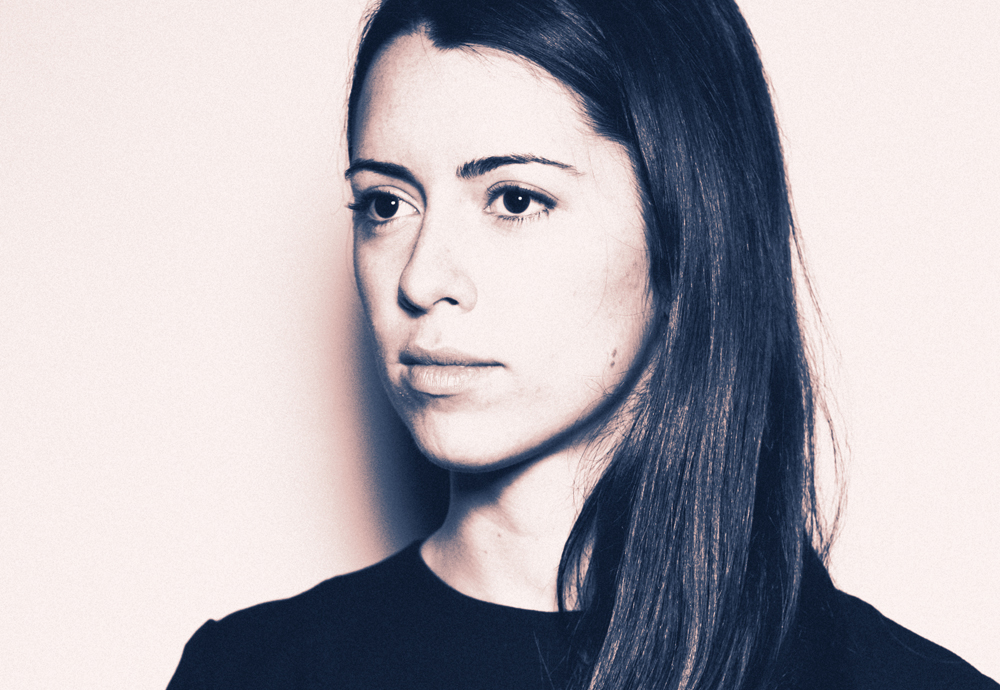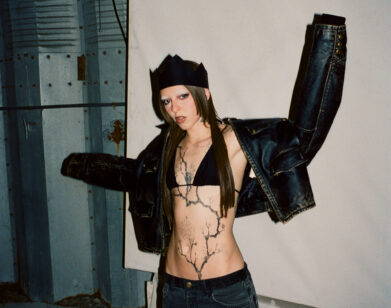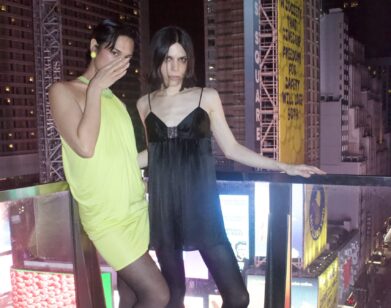Discovery: Wilsen

Hair pulled back, held out of her face with a wraparound ear warmer and hot tea in hand, Tamsin Wilson sits down inside the base lodge of Stratton Mountain Resort. The Brooklyn-based musician, known professionally by her singular moniker Wilsen, emits an aura that echoes the soft-spoken, intimate nature of her songs. Speaking slowly and choosing her words carefully, she’s quiet and reserved, confident yet humble.
Since her first release two years ago, Wilson’s music has retained a specific air of folk, often pairing her acoustic guitar with subtle bass and soft drums—the drummer frequently wielding tom toms opposed to proper sticks—and imbuing her lyrics with storytelling poetics. Influenced by visual artists and authors, such as Gabriel García Márquez, the London-born musician originally attended Central Saint Martins, but following her first year transferred to Berklee College of Music in Boston to study music business. Until late last year, she worked a day job with a music publisher. Now, however, she’s pursuing music full-time and recording her sophomore LP, scheduled for release later this year.
After a long Saturday of skiing in early December, Wilson warms up in the lodge the day before a small outdoor performance as the closing act of a weekend-long music event. She, along with Tei Shei, Ra Ra Riot, The Orwells, and three other bands, plus 100 fans, are in Vermont for “On The Mountain 2,” hosted by music-supporting organization The Wild Honey Pie, to record “buzzsessions,” or what we might simply call live music videos. Before her time to record, we spoke with Wilson, whose recording session went live online today.
NAME: Tamsin Wilson
AGE: 25
BASED: Brooklyn, New York by way of London and Canada, near the Rocky Mountains
BECOMING WILSEN: I met Drew [Arndt, the bassist] when I first moved to America, to Boston, to go to university. He and I always shared similar aesthetics and ideas. He was doing his final project for school and asked me to collaborate and do some of my songs for it. Just before that I had met Johnny [Simon Jr., the bassist] in my last year of university. We started playing together; he started playing guitar on some of my songs. Then when Drew asked us to do the project, it all came together.
HER DEBUT LP, SIRENS: Friends suggested we put out an album. A friend of mine said, “Hey I have this great studio in this barn up in the middle of nowhere Ontario. If you want to go record all the songs you have, let’s go do it and have some fun.” After we recorded, I was working with a couple friends who were like, “Let’s get this out there and send it to blogs.” I’ve been really fortunate to know people who have carried it along. I never have wanted to shove any creation down someone’s throat. I feel like if people are gonna like it, then hopefully they’ll hear about it, and if they don’t, that’s absolutely fine. I will retire and I will do something else. I just hate the idea of pushing things down people’s throats.
SHUTTING OFF FROM THE WORLD: It’s really unhealthy, but [shutting off is] the only way I work. It’s awful. [laughs] It is and it seems totally reclusive and horrible. I’m hoping I will expand my creative process down the line, but it’s always been a really personal and isolating process for me. I started playing music because I was writing songs, putting some of my words to chords on a guitar. It’s always been a very intimate and solitary experience. Nowadays, I will try and find a space I can go to for a day and a half. Last year I took a couple trips upstate, literally shut everything off, and just sat there and relentlessly played the guitar to see what would come out. At home, I’ll do the same thing and look like a total loser, just shut my door for two days. Again, it’s so unhealthy. I would love to be able to be like, “Okay. An hour today, an hour tomorrow,” but it takes a while for my mind to really become uninhibited and explore all those creative elements and places.
OPENING HER MIND: It’s not very conscious—that sounds really heady, sorry—but I will start playing some chords or certain melodies, or start singing certain melodies. I like tracking while figuring out ideas. If I press record then it’s about at the one minute or two minute mark that you start loosening up and exploring, so you’re not consciously thinking about what notes are missing or if a chord sounds nice or it doesn’t. Again, I’m hoping this will change, but I tend to write [lyrics and chords] separately. I’ll spend time writing, writing, writing a stream of consciousness and then one day I’ll pickup the guitar and I’ll find a core progression. Then I’ll try to match them together.
INFLUENCE OUTSIDE OF MUSIC: In terms of basic language, words, sentence composition, and imagery, reading, definitely… Gabriel García Márquez, because of his imagery; it’s always been so beautiful. I wish I knew Spanish so I could read it in its original language. I can’t even imagine what it’s like without being a translation. I learn a ton from so many authors, and visual arts as well. That’s where I kind of stemmed from; I was always more of a visual artist than musician.
CONTRASTING COMPOSITIONS: I could say very generally what I love in an art form is compositions of contrast, so two items that don’t necessarily seem like they should be married, but are. Whether it is this geometric shape with these really small, flush colors, or something similar in design. What I value so much in any art form, and music as well, is just the juxtaposition of different layers that you wouldn’t generally and obviously think about. That’s something I strive to find. There’s so much room for exploration and it’s your responsibility to make things interesting.
DESIGNER-TURNED-MUSICIAN: I started writing songs in high school, when I was 15 or 16, but then I went to art university because I always wanted to be a designer. But before I started art university, I did a summer program in music. I remember the whole experience being so collaborative and it was really cool. When you’re in the height of your emotional state is when you’re a teenager, when you’re about to embark on your independent life. So that, for me, was a total blessing. The art school that I went to was really competitive and it kind of terrified me. It shouldn’t have been, but I think it was too young for me. If I had gone a couple years later, then I’m sure I would’ve been fine. But I was looking for that university experience, where you’re in dorms and just having fun. At the end of the foundation year you have to submit your portfolio for review, so everyone’s competing for places. It terrified me, so I thought music was what I had to do. It was just what I had to do for some reason, so I switched paths and moved to America and studied music.
FEAR OF FACING FORWARD: One [struggle] I continually face is publicization of everything, as in the performance element, the forward-facing aspect of music. Writing was always so personal and it was never meant to be anything but that. No one was ever meant to hear it; no one was ever meant to listen. Even in university, I didn’t study performance because I wanted to work behind the scenes. I did not want to be on the performing end of things. Naturally, it terrifies me to have your face out there, to do interviews, to be on stage. Now that I play with the guys, who are amazing and have become such incredible friends, it’s made performing so much easier, but I still struggle with the idea that your persona comes along with the music.
A PHILOSOPHY TOWARD MUSIC: To challenge your natural tendencies when it comes to creation, but also to ensure that you’re creating art that means something to you personally, that comes from a genuine place, whether it be an experience or a dream or whatever. Because ultimately, I feel people respond to an art form that is felt by the person who is presenting it.
FOR MORE ON WILSEN, VISIT HER BANDCAMP.






